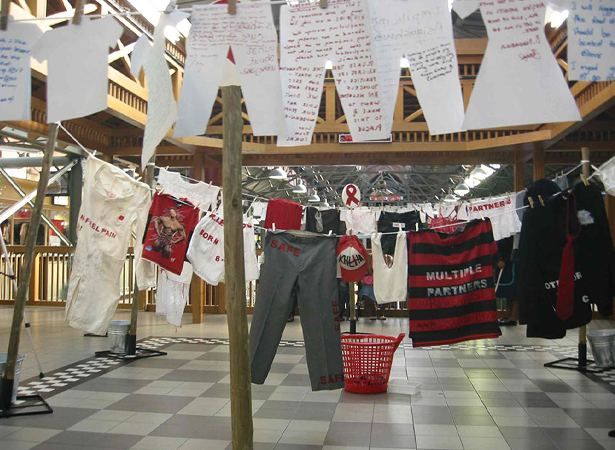
The Washing Line Installation (2006)

Artist's Statement
The aim of “The Washing Line” project was to encourage people to examine issues around HIV/AIDS, gender, equality and patriarchy, and to open discussions that might lead to positive changes in behaviour as a means of curbing the spread of HIV/AIDS.
South Africans live in a male-dominated society wherein males make the decisions, and women have little bargaining power. Younger women - between the ages of 15 and 24 years - have even less bargaining power. Condoms are not part of traditional African culture. Ignorance, lack of education, myths, stigma, poverty and poor nutrition (which lowers immunity), are all factors that contribute to the HIV/AIDS pandemic. Women are especially powerless when they have children to care for, do not own a home and do not have a job. Women might choose to be monogamous, but in Africa many men are not. Prostitution is not legalised and so sex workers have no support or protection. Rape of women is a huge problem, as is the rape of children and virgins. The reality is that the number of girls and women affected with HIV and AIDS has increased in every region of the world in the last two years. Almost half of the adults living with HIV and AIDS are women. In sub-Saharan Africa, 60% of infected people are girls and women.
The clothes were taken from the washing line and used by the performers and educators as props for a play, storytelling and as a catalyst to open up discussions with the public. Facilitation at the Gazebo and Sloane Square venues was done by Ntombi Mbambo from Street Law South Africa, with some help from Mondli Dlamini, Yerushka Chetty and Nozipho Zulu.
At the Amphitheatre venue, facilitation and performances were done by Men as Partners, Oby Obyerodyhambo from Kenya, The Fatherhood Project and the Wentworth Organisation of Women. Supporting partners holding information and awareness stalls were the eThekwini Department of Health, KZN Network on Violence Against Women, the Black Sash, Amnesty International, NICRO, ATIC, Gender AIDS Forum and the South African Police Services.
With the help of the public, new washing lines were created. Small paper clothes were hung on the lines onto which comments were written by the public in English and isiZulu with their responses to their experiences at The Washing Line.

